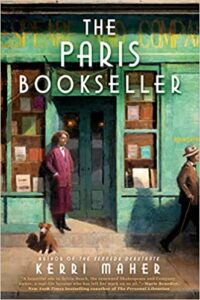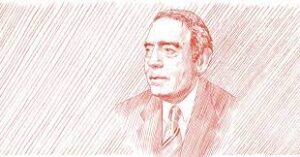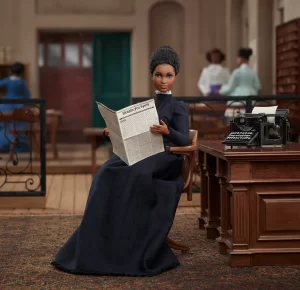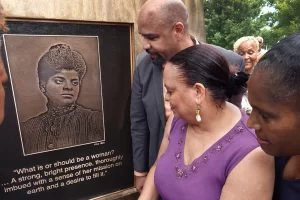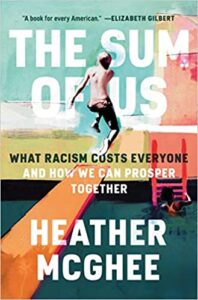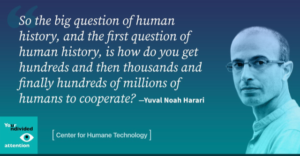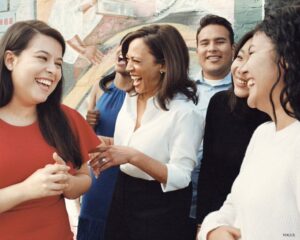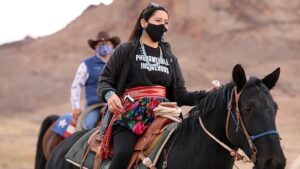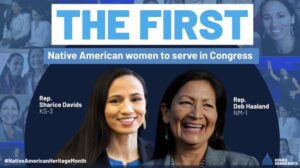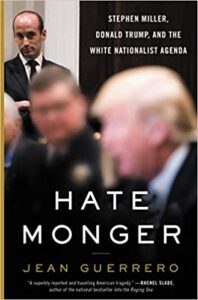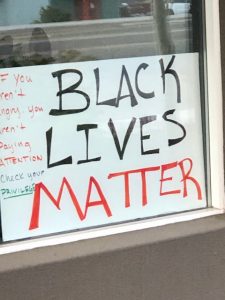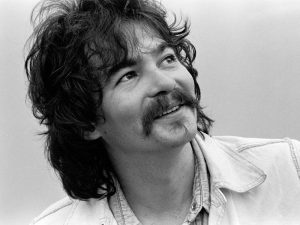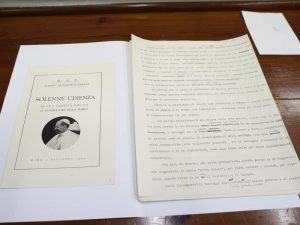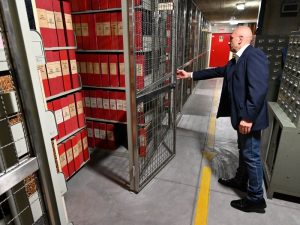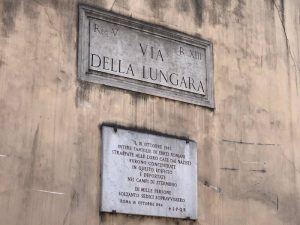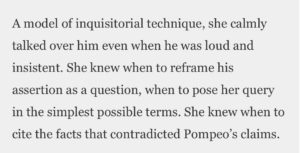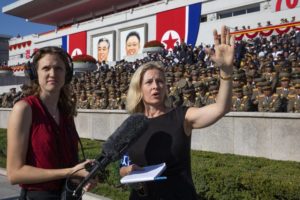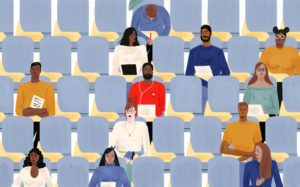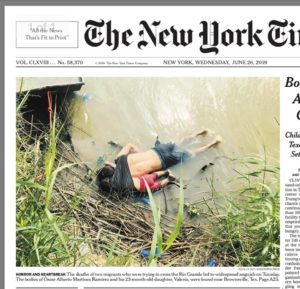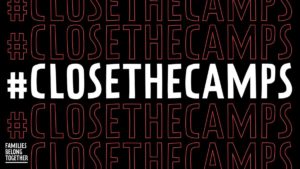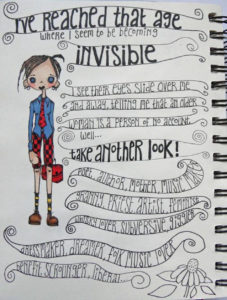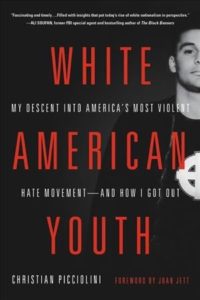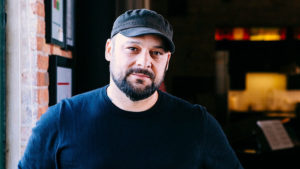NPR
Sunday, February 6th, 2022
February 6, 2022p. 53
“…liberté, égalité, et fraternité triumphed, and here, a place of exchange between English and French thinking, we get to enjoy the spots of peace: literature, friendship, conversation, debate. Long may we enjoy them and may they…instead of guns and grenades…become the weapons of new rebellions.”
p. 49
“The world as we knew it has ended, and it’s time for something entirely innovative.”
From Seth Godin.
In defense of non-interactive media
It doesn’t talk back. It doesn’t beep or update or invite a click. It doesn’t change based on who’s consuming it. It doesn’t interrupt you, and it begs to not be interrupted.
It’s rarer than ever before, and sometimes, we need it.
Agree. Completely. I think all comments across all social media platforms should be muted for six months.We must recalibrate. Let us read, absorb, research…enact media literacy and ease the meanness, vitriol, hateful and polarization with our words. Practice Lectio Divine…contemplative interaction…not words…conversations through meaning and meditation. We need it…indeed. -dayle
From Dan Rather.
We often hear of the tides of history, as if the fate of the world shifts in unison – the rising and lowering of a great sea of fortune. Tides are predictable. They are unstoppable. They are acts of nature. Human affairs, while inextricably tied to planetary forces, are also shaped by the actions we take, and do not take. Our destinies do not move with any great cohesion or coordination. Rather we are more like boats tossed by the accumulation of countless individual waves (to stretch our maritime metaphor), cresting and receding, churning and placid, forceful and gentle. These can be waves that push us backwards, but they can also propel us forward to a better future.
When looking back at the past, it is tempting to see paths as preordained – narratives we neatly tuck into the contextual confines that make them easier to understand. In contrast, the present is always messy. It will only become clearer once we know how it ends, at which point we will be living in a new era of uncertainty.
We can never dismiss the many challenges we face or the threats they pose. They are particularly dire. The list of woes bears repeating and remembering – from the climate crisis, to the ongoing threat to our democratic institutions, to our continued struggle for racial justice, to the threats of war, to the pandemic, and onward.
In the future we may look back and see that one of these forces escalated to a point of even greater dominance, and disaster.
One of the few things I have learned with any certainty over the course of a long life is to be wary of certainty. Those who predict with the most confidence what will happen in the future are often the voices that should be treated with the greatest skepticism. These paragons of certainty invariably are the ones who talk the most and consequently do the least to make a difference.
Substack: Islands of Hope
Both sides…not working now. It’s lazy journalism. -dayle
‘Both sides’ journalism does not always show us the truth
Journalists are bound to tell the truth, not give platforms to positions which are demonstrably wrong in a misguided attempt to be ‘impartial’.
“Flat-earthers are not going to get as much space as people who believe the Earth is round, but very occasionally it might be appropriate to interview a flat-earther. And if a lot of people believed in flat Earth we’d need to address it more.”
The BBC’s director of editorial policy, David Jordan, tried to make a defence of impartiality. Instead, he inadvertently showed us why the dogma is so dangerous.
It’s time to end both-sidesism. For so long, the idea of impartiality has been treated as more a matter of faith than a principle to be debated.
Where does this end? If we’re giving airtime to flat-earthers, then surely Syrian war crimes deniers are entitled to a platform. How about genocide deniers, 9/11 conspiracy theorists, and people who think there’s no climate emergency?
In the UK, the dogma of impartiality led the media to the false equivalence trap during Brexit. Pro-EU campaigners were given their share of airtime, and then the other side said it had “had enough” of listening to experts and fed viewers factually incorrect claims.
On other issues, too, the shrine of impartiality has taken us to dangerous places.
It took the BBC until 2018 to recognise that it wasn’t necessary to host a climate crisis denier to balance a debate about the impending environmental emergency. The BBC briefing note read:
“To achieve impartiality, you do not need to include outright deniers of climate change in BBC coverage, in the same way you would not have someone denying that Manchester United won 2-0 last Saturday. The referee has spoken.”
But that was a long three years ago. Before COVID conspiracy theories and leaders in the UK and US began regularly mixing fact with fiction.
Why is impartiality valued more highly than truth? We know that we’re failing as journalists when around 25 percent of people avoid the news in the UK, and one of the main reasons is because they can’t trust the news to be true.
Journalists are not naive storytellers incapable of discerning fact from fiction.
If we don’t stop giving a platform to things we know are false, how are we going to win back that trust?
Ironically, it’s the BBC that is leading the way in the UK’s fight against fake news: they have a specialist reporter covering disinformation online, and in 2021, they appointed their first health disinformation reporter.
I know what you’re thinking: give them a platform, and then robustly challenge them. Let their arguments crumble in the face of a tough line of questioning. Here’s the danger with impartiality purists: simply repeating false claims – even if it’s challenged – can push people to believe the false statement.
This isn’t a manifesto for throwing impartiality out of the window. We’re not campaigners or activists. We shouldn’t have an agenda.
But we’re also not naive storytellers incapable of discerning fact from fiction. The New York Times and many other publications did readers a service when they called former President Donald Trump’s lies, lies.
Fairness doesn’t mean giving a platform to factual inaccuracies just because they’re popular. That’s what Twitter is for.
There are not always two sides to every story.
Sakhr Al-Makhadhi is Executive Producer for AJ+
Remember reading the paper?
by Scott Simon
NPR
Image: A worker at a San Francisco Chronicle printing plant arranges stacks of freshly printed newspapers in 2007. Its digital version, like that of so many newspapers’, is behind a paywall. -Justin Sullivan/Getty Images
The road to free information and opinions seems to run into a lot of paywalls.
Want to finish reading an article? You can, but only if you subscribe for just $1 for 3 months, which becomes $11.99 a month thereafter, and into perpetuity, until your credit card expires. Even if it’s after you do.
I have a strong, even personal interest in paying journalists fairly. But the cost most people have to pay these days if they want to try to stay informed and enrich their minds with a range of opinions is pretty steep.
It’s become harder to read more than an article or two in most publications, which may no longer be the word. News sites, from The New York Times and The Washington Post to The Des Moines Register, insist you subscribe. So do Ebony, The New Yorker, The Economist, Rolling Stone and opinion journals, including The Nation and National Review, and sports-reporting sites. And of course, there are proliferating newsletters and extra-access-plus plans, as news broadcasters begin their own subscription services. They don’t crave an audience, so much as what they call a “customer base.”
“You can’t do much web grazing of quality content these days without a paywall clanging shut on you,” Jack Shafer wrote last year in Politico. “What delights publishers about subscriptions is what everybody from Amazon to Spotify to the Dollar Shave Club to Netflix love — the annuity-like reliability of steady revenue.”
But the cost of inducing people to subscribe is to make news, information and a range of opinions available to only those who have the means to afford and receive them online. This skews the audience toward what Nikki Usher, a University of Illinois College of Media associate professor, calls the “rich, white, and blue,” as in left-leaning.
The political and social divides, which so many decry, may begin between those who can and those who can’t afford access to a wide range of fact-checked, accurate information.
Disinformation, of course, is utterly free.
Newspapers and magazines often got ink on your fingers. But they were cheap. Anyone with pocket change, rich, poor, students or job-seekers, could buy a copy of a magazine with Princess Diana or Oprah Winfrey on the cover or a newspaper when the headline said MAN WALKS ON MOON, or, yes, HEADLESS BODY IN TOPLESS BAR.
The internet has made news and views of all kinds, from all over the world, available on screens we can keep in our pockets. But so many paywalls have pulled costly shades over those screens.
https://www.npr.org/2022/02/05/1078377406/opinion-remember-reading-the-paper
We need an opportunity to reestablish and recalibrate the purpose and necessity of the Fourth Estate. What should the institution’s moral compass be based on the ideals of the U.S. Founders? The U.S. Founders believed a free press vital to democratic debate. So how did the current contemporary news culture evolve into a climate of disinformation and false news? Further, how did an institution created for public service evolve into an influential economic profit platform more destructive than instructive? Free Press co-founder, author and professor Robert McChesney is an activist for government subsidized non-profit media, a model the United States Founders had encouraged for a free press. He believes the Founders did not “authorized a corporate-run, profit-motivated, commercially driven media system with the First Amendment.” Corporate owned media is complicit in misinformation, and disinformation, for ratings, clicks and profits. This must change. And the change begins with our consumer information behaviors and tech media regulation. Democracy may die in darkness, but right now it’s happening in broad daylight. The pillar of the Fourth Estate is crumbling. -dayle
“Some would say that humanity is destined for self-destruction; that our history of lethal violence towards our own kind has programmed us to be fearful, suspicious, revengeful and greedy; and, despite our modern age, this programming now threatens our well-being on a global scale never witnessed before. But does it have to be this way? Can we not consciously evolve into a different kind of human?”
-Helen Marriott
I propose a journalism renaissance based on spiritual companioning, or homo spiritus, and radical compassion (Khen Lampert), deep empathy for other within democratic social process, a heart-based journalism paradigm in necessary community; a Fourth Estate defined in the third space of spirit, love, dignity, and humanity. -dayle
Memphis Free Speech
January 11, 2022The new Barbie doll of journalist and activist Ida B. Wells.
Jason Tidwell/Mattel
I had a Skipper and a Scooter. I wish I could have had an Ida B. -dayle
Journalist Ida B. Wells is commemorated with a Barbie doll for fearless activism
NPR
by Elizabeth Blair
Educator, journalist, anti-lynching activist and NAACP co-founder Ida B. Wells joins the pantheon of distinguished women honored by Mattel with her own signature Barbie doll. Resplendent in a deep blue, floor-length dress with lace details, the new Ida B. Wells doll also comes with a historically significant accessory: a miniature replica of the Memphis Free Speech, the newspaper where Wells became editor and co-owner in 1889.
Mattel has created numerous Barbie dolls to honor both historic and contemporary heroines in the hopes of inspiring “generations of girls to dream bigger than ever before.” It’s Inspiring Women Series includes dolls dedicated to Maya Angelou, NASA mathematician Katherine Johnson and singer Ella Fitzgerald.
The oldest of eight children, Ida B. Wells was born into slavery in Holly Springs, Miss., in 1862. When she was 16, both of her parents and a younger brother died during the yellow fever epidemic. Wells raised her younger siblings and became a teacher to support her family.
Daniel and Michelle Duster attend the dedication of a monument to their great-grandmother, journalist, educator, and civil rights leader, Ida B. Wells in Chicago last year.
Scott Olson/Getty Images
“I am honored that Barbie has chosen to celebrate my great-grandmother, Ida B. Wells, as part of its Inspiring Women Series,” says Michelle Duster, author, public historian, and great-granddaughter of Ida B. Wells in a statement. “My great-grandmother was a trailblazer, who courageously followed her convictions and challenged the status quo by fighting for civil rights and women’s suffrage. This is an incredible opportunity to shine a light on her truth and enduring legacy to empower a new generation to speak up for what they believe in.”
A pivotal moment in Wells’ life came in 1883 when she was traveling by train from Memphis to Woodstock, Tenn., where she was a teacher. When she refused to give up her seat and ride in a segregated car, she was forcibly removed. Wells later sued the Chesapeake, Ohio and Southwest Railroad Co. A local court ruled in her favor but the decision was eventually overturned in federal court.
Wells became a fierce anti-lynching activist. She investigated white mob violence and wrote scathing indictments of the lynchings of Black men. Her articles so angered locals, the offices of the Memphis Free Speech were destroyed.
In the preface to her 1892 pamphlet Southern Horrors: Lynch Laws In All Its Phases, Wells wrote, “It is with no pleasure I have dipped my hands in the corruption here exposed. Somebody must show that the Afro-American race is more sinned against than sinning, and it seems to have fallen on me to do so.”
Past and Present. A community dialogue.
February 21, 2021To understand the world knowledge is not enough, you must see it, touch it, live in its presence.
—Teilhard de Chardin, Hymn of the Universe
The American Lie.
No. Not the election.
The big lie in the United States is racism only effects people of color.
Heather McGhee’s book is brilliant. She is brilliant. Her book is incredibly researched and synthesized. A must read book for every journalist, politician, policy creator, and student. Actually, you know what? Everyone should read Heather’s book. And she speaks like she writes, clearly, foundationally, and directly. We need to listen. -dayle
NPR/Fresh Air
The heart of McGhee’s case is that racism is harmful to everyone, and thus we all have an interest in fighting it. Drawing on a wealth of economic data, she argues that when laws and practices have discriminated against African Americans, whites have also been harmed. When people unite across racial and ethnic lines, she argues, there’s a solidarity dividend that helps everyone.
Heather McGhee is the former president of the progressive think tank Demos, where she spent much of her career. She holds a BA in American Studies from Yale and a law degree from the University of California, Berkeley. She currently chairs the board of Color of Change, a nationwide online racial justice organization. Her new book is “The Sum Of Us: What Racism Costs Everyone And How We Can Prosper Together.”
Heather McGhee:
This to me is really the kind of parable at the heart of the book. It’s what’s illustrated on the cover. In the 1920s, ’30s and ’40s, the United States went on a building boom of these grand resort-style swimming pools. These were the kind that would hold hundreds, even thousands, of swimmers. And it was a real sort of Americanization project. It was to create a, like, bath-temperature melting pot of, you know, white ethnic immigrants and people in the community to come together. It was sort of a commitment by the government to a leisure-filled American dream standard of living. And in many of these public pools, the rule was that it was whites only, either officially or unofficially. And in the 1950s and ’60s when Black communities began to, understandably, say, hey, it’s our tax dollars that are helping to support this public good, we need to be allowed to swim, too, all over the country, particularly in the American South but in other places as well, white towns facing integration orders from the courts decided to drain their public swimming pools rather than let Black families swim, too.
Now, I went to Montgomery, Ala., where there used to be one of those grand resort-style pools and where effective January 1, 1959, not only did they back a truck up and pour dirt into the pool and pave it over, but they also sold off the animals in the municipal zoo. They closed down the entire parks and recreation department of Montgomery for a decade. It wasn’t until almost 1970 that they reopened the park system for the entire city. And I walked the grounds of Oak Park. Even after they reopened it, they never rebuilt the pool. And that, to me, felt like this just tangible symbol of the way that a population taught to distrust and disdain their neighbors of color will withdraw from public goods when they no longer see the public as good.
Interview with Dave Davies on NPR:
https://www.npr.org/2021/02/17/968638759/sum-of-us-examines-the-hidden-cost-of-racism-for-everyone
The Daily Show with Trevor Noah
“The Sum of Us,” and underlines the importance of having honest conversations about past and present racism at a community level.
Ezra Klein/NYTimes
What ‘Drained-Pool’ Politics Costs America
I asked McGhee to join me on my podcast, “The Ezra Klein Show,” for a discussion about drained-pool politics, the zero-sum stories at the heart of American policymaking, how people define and understand their political interests, and the path forward. This is, in my view, a hopeful book, and a hopeful conversation. There are so many issues where the trade-offs are real, and binding. But in this space, there are vast “solidarity dividends” just waiting for us, if we are willing to stand with, rather than against, each other.
Also from the NYTimes.
opinion
The book That Should Change How Progressives Talk About Race
Heather McGhee writes that racism increases economic inequality for everyone.
by Michelle Goldberg
McGhee’s book is about the many ways racism has defeated efforts to create a more economically just America. Once the civil rights movement expanded America’s conception of “the public,” white America’s support for public goods collapsed. People of color have suffered the most from the resulting austerity, but it’s made life a lot worse for most white people, too. McGhee’s central metaphor is that of towns and cities that closed their public pools rather than share them with Black people, leaving everyone who couldn’t afford a private pool materially worse off.
One of the most fascinating things about “The Sum of Us” is how it challenges the assumptions of both white antiracism activists and progressives who just want to talk about class. McGhee argues that it’s futile to try to address decades of disinvestment in schools, infrastructure, health care and more without talking about racial resentment.
[…]
“Communicators have to be aware of the mental frameworks of their audience,” McGhee told me. “And for white Americans, the zero-sum is a profound, both deeply embedded and constantly reinforced one.”
This doesn’t mean that the concept of white privilege isn’t useful; obviously it describes something real. “What privilege awareness does, at its best, is reveal the systematic unfairness, and lift the blame from the victims of a corrupt system,” McGhee said. “However, I think at this point in our discourse — also when so many white people feel deeply unprivileged — it’s more important to talk about the world we want for everyone.”
Center for Action and Contemplation in Albuquerque, New Mexico.
Theologian Howard Thurman, from Walter Brueggemann, The Message of the Psalms: A Theological Commentary [1984].
Thurman takes what is personal and makes it universal. Walter Brueggemann calls this “the scandal of particularity.” [1] We “get it” in one ordinary, concrete moment and wrestle and fall in love with it there. It’s a scandal precisely because it’s so ordinary. What is true in one place finally ends up being true everywhere.
From Barbara Holmes and her lecture Race and the Cosmos, unpublished Living School curriculum.
As I considered it, the truth of the matter was that we were living within an old story; and a new story needed to be told, but we didn’t have the language for it.
The old story was of victimization, marginalization, oppression, oppressors; and the new story would see all of us evolving, self-expanding, and finding a new place in this wonderful cosmology that is a reality we have not paid attention to. So, in order to get to that point—and here is where my transformation begins—I had to reconsider what I thought about people, because I had hardened my view of others and who they were and what they meant. I had spent my time raising two little African American boys who had to be taught how to survive in society. In doing that, I taught them to view the world in only one way; and I myself was hardened into a position that either you were with me or you were against me or us.
All of that had to change. I had to begin to think of us as spiritual beings having a human experience, and not bodily, embodied folks without spirit or soul. . . . That’s a very limited view of humankind, and I wanted to expand the story. . . .
The physics and cosmology revolution that is 100 years old has not been translated into the ordinary world of any of us, and specifically not in communities of color. The world that scientists describe now is so different than the world that I grew up in or even imagined. According to physicists, this is what the world is like: it is a universe permeated with movement and energy that vibrates and pulses with access to many dimensions. . . . We are all interconnected, not just spiritually or imaginally, but actually . . . and the explicate [or manifested] order that’s all around us makes us think that we’re separate. Finally, I learned that ideas of dominance are predicated on a Newtonian clockwork universe. So, like dominoes, you push one and they all fall down, and everything is in order. But quantum physics tells us that the world is completely different. Particles burst into existence in unpredictable ways, observations affect the observed, and dreams of order and rationality are not the building blocks of the universe.
A compilation piece: 2-part documentary on PBS, The Black Church: This Is Our Story, This Is Our Song, from executive producer, host, and writer Henry Louis Gates, Jr.
It traces the 400-year-old story of the Black church in America, all the way down to its bedrock role as the site of African American survival and grace, organizing and resilience, thriving and testifying, autonomy and freedom, solidarity and speaking truth to power.
It is now available online.
https://www.pbs.org/show/black-church/
Cicely Tyson December 19, 1924 – January 28, 2021
Kennedy Center Honors, December 2015.
Unity?
January 19, 2021Documentary film maker Ken Burns:
“I used to think there were three great crises: the Civil War, the Depression and the Second World War in American life. I would add this. And maybe this is the very, very worst. But at the same time, we just keep going forward. There is no other option but to endure.” [NPR]
‘Well, darkness has a hunger that’s insatiable, and lightness has a call that’s hard to hear.’
-Indigo Girls
American politics has reached a moment of existential uncertainty. Beyond the headlines and news alerts are problems bigger than any one administration—problems that stem from the deep tensions and challenges in America’s political institutions.
It’s time to reevaluate and revisit how we think about American democracy. The Founding Fathers did their best, but the hosts of a new podcast, “Politics in Question,” have some ideas, too. They discuss political reforms in this first-of-its-kind show that asks the very biggest questions.
Join hosts Lee Drutman, Julia Azari, and James Wallner, three lively experts on American political institutions and reform, as they imagine and argue over what American politics could look like if citizens questioned everything.
There are a lot of podcasts about the daily chaos. But “Politics in Question” is the first to step back and think big about the basic structures and processes of democracy — and to take nothing for granted.
This podcast is part of The Democracy Group, a network of podcasts that examines what’s broken in our democracy and how we can work together to fix it.
“From all the thoughts of ‘I’ and ‘man,’ that man finds utter peace.”
Bhagavad Gita
Dear Dayle,
The extremist behavior and violence that took place in Washington, D.C. on January 6 was truly shocking and worthy of condemnation—many have already done so. The whole world is transfixed, bearing witness to the awful and extraordinary unfolding of history.
In my previous letters I wrote about the DISORDER that is already upon us, as well as the consequences that ensue when illusions of power and privilege co-opt and distort Christianity. At the Center for Action and Contemplation, we are free to speak in great part because we are not beholden to the usual constituencies. Using the brilliant metaphor from the Hebrew Scriptures, we are “outside the camp” of either political party, any need to influence an election, and, by the grace of God, any negative or fear-based church pressure from Rome, Santa Fe, or Assisi.
We are also, like few other organizations, free from the coercion of donors and finance, thanks to almost thirty-three years of operating with our priorities clearly in view to all who cared to study or read our publications. Blessedly, our donors have not run for cover over time, but only increased in numbers, continuing to join us—even from outside the usual camps of both religion and politics.
Few people enjoy such freedom of living and teaching from the edge of the inside. This is the unique position that a prophetic charism holds and for which it is responsible; it is structurally quite rare, and therefore we must use it.
“Moses used to take the tent, and pitch it outside the camp, at some distance from the camp. . . . Anyone who wanted to consult Yahweh would go to this tent of meeting outside the camp.” (Exodus 33:7)
The “tent of meeting” is the initial image and metaphor that eventually became our much later notion of “church.” Moses had the prescience and courage to move the place of hearing God outside and at a distance from the court of common religious and civic opinion—this was the original genius that inspired the entire Jewish prophetic tradition. It is quite different than the mere liberal and conservative positions, and often even at odds with them. Most of liberalism is based on a secular foundation of knowledge, and most of conservatism is identified with boundary-keeping, order, and control. By contrast, Prophecy and Gospel are rooted in a contemplative and non-dual way of knowing—a way of being in the world that is utterly free and grounded in the compassion of God.
The early desert fathers and mothers imitated both Moses and Jesus by fleeing to Egypt, Syria, Palestine, and Cappadocia—and some as far as Ireland and Scotland. Beginning in the 4th century, we Christians surrendered our unique and free perspective to the Roman and Byzantine Empires. In the desert and outside the camp, these people discovered what we now call “contemplation”: the alternative mind and the alternative community to the status quo—then and now—of money, power, and war.
The free and graced position found in the tent of meeting is what allowed Jesus and all prophets in his lineage to speak from a minority position. It is always less desirable, compared to the comfortable and enjoyable places at the center and the top; yet it is the Jesus stance, and the place where all Franciscans follow after him.
“Let us go to him, therefore, outside the camp, and be willing to share in his degradation.” (Hebrews 13:13)
For many people, religion as a “cosmic egg” capable of holding universal Truth, collective and personal meaning, is broken. Now, the cracks in this very “uncosmic egg” are rapidly spreading in all directions. Delusions enthrall us and inherent deceit becomes overwhelmingly apparent and manifest in the nihilism of our postmodern age, the denial of science and reasonableness, and the denial of the pandemic that now assaults us all. The very future of the meanings of words and truth are at stake, as specifically exemplified by Trumpism in its many forms.
We must again move with Jesus outside the camp and even be willing to “share in his degradation” if that be God’s will. We must trust that the one who has called us into this present moment will also sustain us and lead us through it.
“Yahweh would speak with Moses face to face [outside the camp] as a young man speaks with his friend. And then Moses would return to the camp.” (Exodus 33:11)
This is the primary vocation of the Center for Action and Contemplation. We invite you to join us—first, in the tent of meeting outside the camp for prayer, dialogue, and deep discernment. Then, like Moses, we must all choose to “return to the camp,” where all of our brothers and sisters live and die.

Maybe unity is not possible, yet, we can remember that we are one, one in humanity as species and co-creators in our reality with ourselves and in each other…especially in context and proximity of losing our democracy, our republic, just three weeks ago. Can we pledge, at least, to cooperation? To listening? To empathy?
We are ‘we the people.’ Let us remember. And may we vow today to divest ourselves from the for-profit platforms and groups that feed disinformation and hate into our collective bloodstream. It must end.
And in less than 24 hours, the first woman vice president in the United States.
-dayle
The new 4th Estate?
January 12, 2021The 4th Estate refers to a Free Press in the United States, or the ‘4th Branch of Government.’ This morning the AXIOS online news organization, for-profit media, reference corporate America as the new ‘4th Estate’:
‘How CEO’s became the 4th Branch of Government’
America needs law and order — but not the kind President Trump has in mind. That’s the message being sent by a broad coalition of CEOs who are silencing Trump and punishing his acolytes in Congress, Axios’ Felix Salmon writes.
- Why it matters: CEOs managed to act as a faster and more effective check on the power of the president than Congress could. They have money, they have power, and they have more of the public’s trust than politicians do. And they’re using all of it to try to preserve America’s system of governance.
A new political force is emerging — one based on centrist principles of predictability, stability, small-c conservatism and, yes, the rule of law.
- “You cannot call for violence,” Facebook COO Sheryl Sandberg said yesterday in an interview with Reuters Next, explaining why she de-platformed Trump. “[T]he risk to our democracy was too big. We felt that we had to take the unprecedented step of an indefinite ban, and I’m glad that we did.” [FACEBOOK CONTINUES TO BE COMPLICIT. TEXTBOOK DEFINITION OF GASLIGHTING. Facebook is a sponsor of AXIOS. -dayle]
Between the lines: American capitalism is based on a foundation of legal contracts, all of which ultimately rely on the strength and stability of the government.
- When a sitting president threatens that stability by inciting an insurrectionist mob that storms the legislature, corporate America will do everything in its power to restrain him.
Driving the news: Tech giants including Facebook, Google, Amazon and Twitter have worked in concert to quiet Trump and the far right. Other corporations are pulling political funding from all legislators who supported overturning the result of November’s free and fair election.
- All of this has happened before the House can even schedule an impeachment vote.
The backstory: Axios first told you about CEOs as America’s new politicians in 2019, when they increasingly were responding to pressure.
- Then corporate leaders mobilized last spring on coronavirus response, last summer over racial justice, and now they are joining ranks on climate change.
What’s next: After dipping toes in for the past year and a half, CEOs are now all-in.
- They’re in a whole new league of activism — with no going back.
Remember, GOP leaders, today, announcing their agreement for impeachment are also reacting to corporate media saying their funding, donations, are suspended. It’s money, it’s power, it’s greed—those are their motivations. Always. -dayle
The virus of lies.
We have to describe things as they are. What really happened on that terrible day? “The president of the United States incited a mob to sack the Capitol to lynch the vice president — his vice president.” -Jeffrey Goldberg, The Atlantic
Center for Action & Contemplation:
‘If our framing story tells us that we are in life-and-death competition with each other, then we will have little reason to seek reconciliation and collaboration and nonviolent resolutions to our conflicts.’
NPR:
‘How do I help people that have, unbeknownst to them, become radicalized in their thought? Unless we help them break the deception, we cannot operate with 30% of the country holding the extreme views that they do.’
CJR/Columbia Journalism Review:
‘In 2016, DT got so much free media airtime—more than $2(B) according to the the NYTimes—that he could run a national presidential campaign with a fraction of the ad budget of his competitors; amplifying him has not merely been a Fox News problem.’
Tim Snyder:
‘The lie outlasts the liar. The idea that Germany lost the First World War in 1918 because of a Jewish “stab in the back” was 15 years old when Hitler came to power. How will DT’s myth of victimhood function in American life 15 years from now? And to whose benefit?’
For-profit media has made millions…billions?…from Donald Trump. Mainstream media, the fringes of cable news, all, all, gave DT platforms for disinformation and incited his rhetoric. No Doubt. This could, indeed, have made room for corporate America’s position as the 4th Estate [AXIOS].
I remember, what Don Lemon, CNN, and what so many pundits on news media said in 2015: “People want to see Donald Trump. You want to watch him,” Don Lemon told CNN viewers the day after Trump announced his candidacy. “At least there’s someone interesting in the race.”
NYTimes:
‘At Fox, one former staffer said, the main criterion for choosing a story is whether it will inflame the audience: “The single phrase they said over and over was ‘This is going to outrage the viewers!’ You inflame the viewers so that no one will turn away.”’
CJR/Columbia Journalist Review
From journalist Maria Bustillos:
Media, too Must be held Accountable. [ALL MEDIA]
‘Real accountability, for MSNBC, means a clear and distinct demand for each of its hosts to come clean about his or her own complicity in building and enabling the increasingly violent and extremist Republican Party that led, inexorably, to the ruinous Trump administration. Joe Scarborough, for example, who on Thursday called for the president to be arrested, was not so long ago a frequent guest at Mar-a-Lago, and a staunch ally of Trump the candidate in 2016, as CNN reported at the time:
Scarborough has spoken about Trump in increasingly glowing terms, praising him as “a masterful politician” and defending him against his political opponents and media critics. The Washington Post has noted that Trump has received “a tremendous degree of warmth from the [Scarborough] show,” and [said] that his appearances on the show, in person and over the phone, often feel like “a cozy social club.”
True to form, Chuck Todd brought the most openly cynical and dim-witted take to the party. On Meet the Press Thursday, he spoke with Andrea Mitchell and Katy Tur about the possible motivations of Elaine Chao, Trump’s transportation secretary, who had announced her resignation. “I’m sort of torn on the effectiveness,” he began.
But let’s put yourself… I’m going to try to put myself in her shoes. And maybe you don’t have enough people to do the Twenty-fifth Amendment.… And you want to stand up, and do something, and say something.… But at the end of the day, is it still better symbolically to publicly rebuke him, even if it’s in the last thirteen days, even if it does look like you’re trying to launder yourself a bit, so that maybe you’ll be invited to a better law firm or a better cocktail party, but the rebuke may be still necessary anyway?
I have nothing whatsoever to add to that.’
Global Media Control
January 4, 2021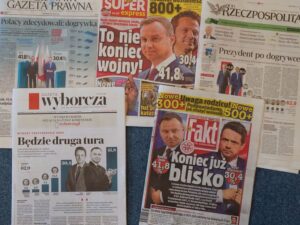
Front pages of main polish newspapers are pictured one day after the first round of the presidential election in Poland on June 29, 2020. – Poland’s right-wing President Andrzej Duda topped round one of a presidential election on Sunday, triggering a tight run-off with Warsaw’s liberal Mayor Rafal Trzaskowski on July 12, according to an Ipsos exit poll. (Photo by JANEK SKARZYNSKI / AFP) (Photo by JANEK SKARZYNSKI/AFP via Getty Images)
NPR
‘Journalist Mariusz Kowalewski noticed something was amiss when his editors came to him with a new assignment: follow an outspoken critic of Poland’s ruling party with a drone.
“The idea was to send this drone over to his house in order for him to notice it and to feel threatened, like he was being watched,” Kowalewski recalls. “This was an intimidation method straight out of communism.”
The order came from his editors at TVP, Poland’s largest broadcaster which oversees a vast network of public television and radio stations.
Kowalewski says he sabotaged the plan by giving the drone operator an outdated address, but he says the episode taught him public television is no longer serving the public. Instead, he says, it’s serving Poland’s governing right-wing populist party, Law and Justice. “Instead of information, viewers now get blunt propaganda that is meant to assure them that Law and Justice is the best party to rule this country,” he says.
The party believes it is fighting an infiltration of liberal European values, spread through foreign-owned media, in this largely conservative Catholic country. Since Poles first voted Law and Justice into office in 2015, its government has not only taken control of the country’s largest public broadcaster, but it has also vowed to “re-Polanize” the national media. Critics say this is code for turning them into government propaganda outlets. The government’s moves to control the country’s media have become a political flashpoint in this European Union member state, which the EU is investigating along with other various rollbacks of democratic norms in Poland since Law and Justice took office.’
TVP is taxpayer funded and previously was editorially independent. But in 2015, Law and Justice began passing legislation that led to a purge of the public broadcaster’s editorial leadership and replaced them with party loyalists. It also put TVP under the supervision of a new National Media Council.
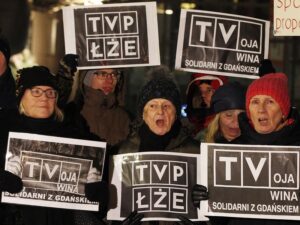
Protesters hold signs demanding the resignation of TVP chairman Jacek Kurski in Warsaw, Poland, Saturday, Jan. 26, 2019, blaming the atmosphere created by the government-controlled television’s “hate speech” for the recent stabbing and murder of Gdansk Mayor Pawel Adamowicz. (AP Photo/Czarek Sokolowski)
Protester chants echoe through the empty city streets of Warsaw: “TVP Lies! TVP Lies!”
The news was propaganda then — and it’s returned to propaganda now, says protest organizer Karol Grabski. “We’ve come here every day since the death of Mayor Adamowicz, who was murdered in Gdansk,” he says.
Gdansk Mayor Pawel Adamowicz — a liberal critic of Law and Justice — was stabbed to death while he was on stage at a charity event in January 2019. Adamowicz had been a target of dozens of TVP news stories criticizing him for real estate dealings, his openness to migrants and his support of LGBT rights. Critics blame the network for creating an atmosphere that led to his murder.
Full piece: https://www.npr.org/2021/01/04/951063118/polands-government-tightens-its-control-over-media
Navajo Nation
November 14, 2020NPR/Kalyani Saxena
‘Hoping to increase young Native American voter turn-out, Allie Young, 30 year-old member of the Navajo Nation, started “Ride to the Polls”—she led groups of voters, ranging from 18-30, 10-miles on horseback to reach polling stations in Kayenta, AZ.’
How The Navajo Nation Helped Flip Arizona For Democrats
According to Vox, 60% to 90% of the Navajo Nation’s roughly 67,000 eligible voters voted for Biden. [AZ was called for Biden this week.]
Members of the Navajo Nation often face high barriers to voting. Many people are not assigned a physical address and are unable to register to vote. Tara Benally, field director for the Rural Utah Project, described to NPR’s Mary Louise Kelly about how the organization managed to register 4,000 Native American voters in Arizona.
The project worked with Google to provide GPS coordinates in lieu of physical addresses. Organizers also left thousands of Ziploc bags with voter registration forms on the doors of Native American voters to avoid the spread of COVID-19.
Reflecting on the Navajo people’s unprecedented turnout, he said: “I appreciate meeting with Joe Biden and Kamala Harris in Phoenix. … [We had] a dialogue, and I think those types of events really inspired the Native American voters to come out to the polls and cast their votes for change.”
#NativeAmericanHeritageMonth
Rep. Deb Haaland (D-N.M.) said that she would happily take on the role of President-elect Joe Biden’s secretary of the Interior if the job were offered to her, according to HuffPost. “Oh yes, of course.” @RepDebHaaland
“…a true ideologue, a true fanatic.”
August 28, 2020“(Jean Guerrero) describes the ideological arc of Miller’s life and investigates his ties to right-wing mentors and far-right groups. She adds, many are baffled at how someone so young with so little policy or legal expertise gained so much power.”
I remember, you know, the incredible anti-immigrant hostility that was pervasive in California at the time, which may be surprising to people because California is known as such a deep-blue state and kind of leads the charge against the Trump administration today. But in the ’90s, it was sort of ground zero, like a microcosm for what we’re seeing nationally today. There were unprecedented attacks on immigrants through a proposition called Prop 187, which, you know, targeted social services for children of undocumented migrants. It was later ruled unconstitutional. There was also attacks on bilingual education statewide. There were attacks on affirmative action.
And the Republican governor of California at the time, Pete Wilson, you know, was repeatedly railing against what he called the invasion at the border – the same language that you see Trump using today – and blaming all of the state’s fiscal problems on immigrants, you know, running these ads on television that I remember watching about how – you know, showing families coming across the border, and there’s this ominous narrator over the video saying, they keep coming.
And from my reporting, it became clear to me that Stephen Miller is truly a product of this environment. He was internalizing a lot of these white supremacist and racist narratives that were common in the state and acting them out, you know, in his high school.
-NPR’s Fresh Air
Important and necessary read–solid investigative reporting from former KPBS San Diego reporter and Emmy award winner Jean Guerrero.
“A vital book for understanding the still-unfolding nightmare of nationalism and racism in the 21st century.” –Francisco Cantu, author of The Line Becomes a River
‘Hatemonger’ Paints Trump Advisor Stephen Miller As A ‘Case Study In Radicalization’
LATimes
Guerrero told The Times that Miller, unlike Bannon and others surrounding the president, is not an opportunist or self-promoter but “a true ideologue, a true fanatic.” Much has been made of the question of what motivates Miller, 35, whose prior experience consisted mostly of PR work for C-list lawmakers before leveraging a single-minded obsession with immigration into the office of then-Sen. Jeff Sessions — and then into speechwriting for Trump’s nascent 2016 presidential campaign.
Guerrero’s book is an exhaustive investigation into not just the how, but the why. She continues to brave threats of violence after conducting more than 100 interviews and researching the darkest corners of the American consciousness to unpack a strange (but not rare) phenomenon: the radicalization of a privileged young white man — though this one, the descendant of Jewish refugees, grew up in an increasingly diverse Southern California.
Guerrero spoke with The Times over the phone from her home in San Diego, a conversation edited for clarity and length. By her account, Miller was primed and groomed — starved for attention, yearning for belonging, and fighting what was, then, a lonely war.’
I honestly believe that the most important reason Miller has been able to stay so long and have such an outsize impact is that he is a true ideologue, a true fanatic. More than anyone else in the White House, he believes that he is actually saving the world through what he is doing. Strategically that has worked out for him — and Trump has found whenever he takes a more moderate line on immigration or anything, he ends up getting ridiculed as weak, which Trump hates.
…nowhere in the book do I call Miller racist or xenophobic, or anything like that. We don’t know what is in a person’s heart with absolute certainty. I grappled with that. Neutrality is necessary for journalistic integrity, an integral pillar of our democracy, and we absolutely need that, but also this reluctance we’ve had as journalists to use these words has created space for white supremacists to operate with impunity.
What I tried to do in the book is show what Miller is doing and saying, and the white supremacist sources, so that people can draw their own conclusions. I did not write this book to tell you that Miller hates anyone. I can say, with the confidence of my reporting, that he is fluent in hate and deliberately traffics in hate and communicates with people who hate.
I think Miller is always going to have allies in the nativist movement and the white nationalist movement, he’s always going to find a place. He is very ambitious. … He’s told people his ultimate goal is to become a senator, and I wouldn’t be surprised if he ran for office somewhere. But I don’t think he’s allowed himself to envision an alternate reality where Trump doesn’t win reelection.
I don’t think Miller and everything he represents is going to go away after November. He’s going to continue to rally people around his ideas, which are not just his ideas.
The thing with Bannon and Donald Trump is, they’re out to con people. … Miller is accountable for his own actions and responsible for everything he’s done, but he was indoctrinated at a very young age into this idea that he needed to save the United States from this imagined threat of Black and brown people.
Full LATimes interview with Jean Guerrero and reporter Molly O’Toole:
All people.
July 3, 20204th of July
‘There is only one true flight from the world: it is not an escape from conflict anguish, and suffering, but the flight from dignity and separation, to unity and peace in the love of other [people].’
-Thomas Merton, Seeds of Contemplation
What Dorothy Day called ‘a revolution of the heart’ is blossoming in our streets, where revolutionaries seem confident America can spend less on war and police, make the 1% and corporations pay their fare share and ensure healthcare, living wages, etc., for all. -Rev. Dr. William J. Barber II
NPR
Frederick Douglass’ Descendants Deliver His ‘Fourth Of July’ Speech
How can you watch and not weep? 4th of July belongs to all of us. It must.
‘In this short film, five young descendants of Frederick Douglass read and respond to excerpts of his famous speech, “What to the Slave is the Fourth of July?” which asks all of us to consider America’s long history of denying equal rights to Black Americans.’
Douglass Washington Morris II, 20 (he/him) Isidore Dharma Douglass Skinner, 15 (they/their) Zoë Douglass Skinner, 12 (she/her) Alexa Anne Watson, 19 (she/her) Haley Rose Watson, 17 (she/her)
Love will rise above all.
Sun Valley, Idaho.
John.
April 9, 2020His life in 10 songs.
♡
NPR
https://www.npr.org/2020/04/06/828225080/john-prines-life-in-10-songs
Please, stay away.
March 28, 2020Sun Valley, Idaho: ‘No One Should Come Here’
NPR/Kirk Siegler
Blaine County, Idaho, which includes the resort town of Sun Valley, has one of the highest known rates of COVID-19 cases in the West.
‘To hear year-round Sun Valley, Idaho, residents like Justin Malloy tell it, town right now is as crowded as you’d expect to see it in the peak Fourth of July or Christmas seasons. The small airport is packed with private jets. And then there’s the parking lot at the Atkinsons’ Supermarket, one of only two in town where bread and essential cleaning items are particularly hard to come by.
“We’ve been seeing a lot of Washington plates, a lot of California plates, their cars just full of all of their stuff that they’ve brought from out of state,” Malloy says.
This has fueled outrage on social media, and on unusually crowded hiking and ski trails, where locals are wondering aloud whether rich people are fleeing cities to seek refuge in rural Idaho, and unknowingly making the public health crisis here even worse.
“It seems likely that people were fleeing other places and not recognizing that they were then bringing the disease with them from Seattle, or other areas where they might live part time,” says Dr. Josh Kern, vice president of medical affairs for St. Luke’s Wood River Medical Center in Ketchum.
While resort towns like this can typically house a lot of tourists or second- and third-home owners, that doesn’t extend to St. Luke’s, which has only 25 beds. The hospital has had dozens of COVID-related admissions and officials warn there are likely many more cases in the community than what’s been diagnosed.
That’s leading to some impassioned pleas to take the recent, strict self-isolation orders seriously.
“No one should come here,” says Dr. Brent Russell, a local emergency room physician.
Russell should know. He has COVID-19. He’s been very sick, so can’t work at this critical time.
“We have a really high percent of COVID spreading among the population here,” Russell says. “If you come here, that is putting your life at risk and it’s putting other lives at risk.”
The hospital is part of a regional health care system, St. Luke’s, so for now, support has been coming from hospitals in Twin Falls and Boise where there aren’t as many known cases. Yet.
https://www.npr.org/2020/03/27/822122059/sun-valley-idaho-no-one-should-come-here
Blaine County COVID rates rival NYC, Wuhan
News analysis: Comparisons are difficult, but the valley has one of the nation’s highest concentration of coronavirus cases
Idaho Mountain Express/Mark Dee
The raw numbers may pale compared to major cities, but Blaine County had the nation’s highest concentration of lab-confirmed COVID-19 cases in the nation yesterday, according to data compiled by the New York Times.
And, its calculation is an underestimate.
So, what do you do with that information? “Take this seriously,” according to a group of eight St. Luke’s Wood River emergency physicians. Self-isolate and abide by the shelter-in-place order designed to stem the spread of the disease.
“We want you to know, given the community spread, that you should not wait for the test or test result,” Drs. Terry O’Connor, Malie Kopplin, Deb Robertson, Jim Torres, Brock Bemis, Keith Sivertson, Terry Ahern and Brent Russell wrote in a letter to the Idaho Mountain Express published Wednesday. “There are measures you can take now to protect yourself, your family, friends, neighbors and way of life. Self-isolate. Don’t leave the Wood River Valley to recreate elsewhere. It’s well known that we have a very high rate of infection; 5B plates are not going to be welcomed outside of Blaine County. Moab and Twin Falls don’t need our virus. Stay home. Save lives.”
Blaine County Deals With Coronavirus Hot Spot As Other Rural Idaho Communities Prepare For the Worst
Boise State Public Radio/Rachel Cohen
St. Luke’s Wood River Medical Center suspended normal operations last week. Coronavirus screening sites, a walk-in-clinic and the emergency department remain open.
If a patient needed to be hospitalized for symptoms of coronavirus in the Wood River Valley today, they’d most likely be transported — by ambulance or helicopter — to a hospital in Twin Falls an hour and a half south, or one in Boise two and a half hours west.
Blaine County — home to Sun Valley, with a population of about 22,000 — is the epicenter of Idaho’s coronavirus outbreak.
“So currently any patient who would be that sick would not be maintained up here. We would be transferring them either down to Magic Valley or Boise,” said Dr. Frank Batcha, a family physician at the St. Luke’s clinic in nearby Hailey.
Patients seeking care for routine check-ups, cancer screenings or caesarean sections are also being directed to other hospitals.
“Are we concerned about not having enough resources? Absolutely. And that’s why we’re trying to conserve what we have right now, particularly our manpower,” said Batcha, who, these days, is typically clad head to toe in personal protective gear as he screens patients for COVID-19 in the parking lot of the Ketchum hospital.
St. Luke’s Wood River is part of the statewide St. Luke’s Health System with seven hospitals, which means staff and supplies can, and are, being dedicated to the Ketchum hospital.
“If we were an isolated, rural hospital, we would be crippled right now, because we have so many people who are out with the illness,” Russell told Boise State Public Radio’s George Prentice.
But strains extend beyond the hospital. Bill McLaughlin, the Ketchum Fire Chief who also oversees EMS services for the north half of the valley, said around a quarter of his paramedics are out because they have coronavirus symptoms or have potentially been exposed in the community.
“We only have a couple paramedics on each day, and if, for some reason, one of them gets sick, then that entire shift would be knocked out for 14 days,” McLaughlin said.
Many volunteers who used to help out are staying home, too.
[full article]
“…all researchers, regardless of nationality, faith and ideology are welcome.”
March 2, 2020Pope Pius XII’s handwriting is seen on a rough draft of his speech in 1944, displayed during a guided tour for media of the Vatican library on Pope Pius XII on Feb. 27.
Gregorio Borgia/AP
NPR
Vatican Opens Archives Of World War II-Era Pope Pius XII
by Sylvia Poggioli
After decades of pressure from historians and Jewish groups, the Vatican on Monday began allowing scholars access to the archives of Pope Pius XII, the controversial World War II-era pontiff.
Roman Catholic Church officials have always insisted that Pius did everything possible to save Jewish lives. But he remained publicly silent while some 6 million Jews were killed in the Holocaust.
More than 150 scholars have applied to study documents covering his papacy, which lasted from 1939 to 1958. Typically, the Vatican waits 70 years after the end of a pontificate to open its archives to scholars.
Speaking to reporters on Feb. 20, the Vatican’s chief librarian, Cardinal José Tolentino Calaça de Mendonça, said all researchers, regardless of nationality, faith and ideology, are welcome.
“The church is not afraid of history,” he said, echoing Pope Francis’ words when he announced his intention to open the Pius XII archives a year ago.
Jewish groups welcomed the opening of the archive. “In inviting historians and scholars in to publicly access the Vatican’s World War II archives, Pope Francis is demonstrating a commitment to learning and airing the truth, as well as to the significance of Holocaust memory,” World Jewish Congress President Ronald S. Lauder said in a statement.
John Ickx, a Vatican archivist, says scholars will have easy access to the files.
“We have now passed 1 million and 300,000 documents that are digitalized and interfaced with an inventory for it, to help the researchers to go quickly,” he says.
Those researchers have been waiting a long time. A 1963 German play, The Deputy by Rolf Hochhuth, sparked questions about Pius’ wartime role and accused him of complicit silence in the Holocaust. The Vatican’s attempts to beatify him are stymied by still-vivid memories in Rome of his behavior toward the city’s Jews during the Nazi occupation.
A plaque on the wall outside a military college in Rome recalls the roundup of 1,259 Jews. It reads: “On 16 October 1943 entire Jewish Roman families ripped from their homes by the Nazis were brought here and then deported to extermination camps. Of more than 1,000 persons, only 16 survived.”
The location is just 800 yards from St. Peter’s Square — “under the pope’s very windows,” as Ernst von Weizsacker, then serving as Germany’s ambassador to the Vatican, reported back to Hitler.
Brown University’s David Kertzer has written extensively about popes and Jews. He won the 2015 Pulitzer Prize for his book The Pope and Mussolini: The Secret History of Pius XI and the Rise of Fascism in Europe, about Pius XII’s predecessor, and has reserved a desk in the Vatican archives for the next four months.
Roman Catholic Church officials have always insisted that Pope Pius XII, shown here in an undated photo, did everything possible to save Jewish lives. But he remained publicly silent while some 6 million Jews were killed in the Holocaust.
AP
Kertzer says a lot is known about what Pius XII did. Much less is known about internal deliberations during the war years in the Vatican.
“We know [Pius XII] didn’t take any public action,” he says. “He didn’t protest to Hitler. But who within the Vatican might have been urging him to do so? Who might have been advising him caution? That’s the kind of thing I think we’ll find out, or hope to find out about.”
Like many church historians, Massimo Faggioli, who teaches theology at Villanova University, is also curious about Pius’ role after World War II, during the Cold War. In particular, he wonders, did Vatican officials intervene in Italian elections in 1948, when there was a real possibility of a Communist Party victory?
“I would be curious to know so what kind of communication there was between the [Vatican] Secretariat of State and the CIA,” he says. “Pope Pius was certainly convinced that he had to defend a certain idea of the Christian civilization in Europe against communism.”
Kertzer is certain the Catholic Church was horrified by the Holocaust. In fact, several thousand Jews found refuge in Catholic convents in Italy. But what he hopes to understand better from the Pius files is the role played by the church in demonizing Jews.
“The main purveyors of vilification of Jews for many decades was not the state, it was the church,” he says. “And it was vilifying Jews right up through the ’30s and right up to the beginning of the Holocaust, if not into it, including Vatican-related publications.”
This, Kertzer says, is what the Vatican needs to come to terms with.
https://www.npr.org/2020/03/02/811170588/vatican-opens-archives-of-world-war-ii-era-pope-pius-xii
Mary Louise Kelly
January 28, 2020[Former Pen America Center president Francine Prose’s appreciation of Mary Louise Kelly in The Guardian.]
‘Mary Louise Kelly stood her ground…supporters of accountability journalism have the occasion to celebrate the courage of DC’s elite political journalists – Too many political reporters choose to pull their punches to maintain access.’
One brave political reporter raises the bar for her timid colleagues
Mary Louise Kelly stood her ground.
Kelly, who is the host of NPR’s All Things Considered and a veteran national security correspondent, made the best of her on-the-record interview with Secretary of State Mike Pompeo by posing tough questions and calling him out when he answered with lies.
Then, after he summoned her to his office, tried unsuccessfully to challenge her competence, and cursed her out, she went public.
It’s not often that supporters of accountability journalism have the occasion to celebrate the courage of Washington’s elite political journalists – and from NPR, no less. Too many political reporters choose to pull their punches to maintain access.
-Dan Froomkin/Press Watchers, An Intervention for Political Journalism
The Professor
January 11, 2020Rush Drummer Neil Peart died on January 7th at the age of 67.
“Peart’s love of literature and reverence for history deeply informed his songwriting. “Red Sector A,” for example, emerged after he read accounts of World War II concentration camp survivors. “Manhattan Project” addresses the U.S. dropping atomic bombs on Japan in 1945, from multiple viewpoints. For much of Rush’s career, Peart was also dogged by long-ago praise for the author Ayn Rand, whose works were an influence on the sprawling 1976 song cycle 2112. (He later clarified that Rand’s work no longer resonated with him.)
In a 2015 Rolling Stone cover story, Peart self-described as a “bleeding-heart libertarian.”And, above all, his lyrics made people think — Rush fans were liberal, conservative, religious, non-religious — but they all united around their respect for the band and their admiration for how Neil could articulate their experiences, or give them a new way to look at an issue.”
In no small part because of his erudition, Peart’s erudition earned him the nickname “The Professor.” It was apt: Carrying himself with an air of well-spoken authority, he possessed knowledge about a variety of topics, owing to his extensive global travels — on Rush tours, he was known for taking off on bicycle rides and, later, would hop on his motorcycle to travel between gigs — and a voracious curiosity about the world around him. In his 2002 book, Ghost Rider: Travels on the Healing Road, he described going to art museums in the afternoons before Rush concerts “to feed my growing interest in paintings, art history, and African carvings.”
While an interesting travelogue, at its root Ghost Rider was a chronicle of how to repair a shattered self. The book details how Peart embarked on a solo motorcycle trek “to try to figure out what kind of person I was going to be, and what kind of world I was going to live in” after his 19-year-old daughter, Selena, died in a 1997 car crash, and his wife Jackie passed due to cancer the following year.
All told, Peart released seven nonfiction books, several fiction collaborations and poured out thousands more words via his personal website. “What made Neil such a good writer is how much he loved to read,” Halper says. “He really loved and respected books. He loved good literature — he and I sat around one night talking Shakespeare — he loved poetry, he loved philosophy. He valued good conversation. He was a thinker — in the truest sense of the word.”
As any Rush fan will share, air-drumming to 1981’s “Tom Sawyer” can be one of life’s greatest pleasures.
[Excerpt from ‘Remembering Neil Peart, A Monster Drummer With A Poet’s Heart’, by NPR’s Annie Zaleski.]
A favorite quote from Bob Dylan, taken from a 1978 Rolling Stone interview: “The highest purpose of art is to inspire. What else can you do for anyone but inspire them?”
Rush was inducted into the Rock & Roll Hall of Fame in 2013.
NPR/Education
December 16, 2019Fewer Students Are Going To College. Here’s Why That Matter
12.16.19
This fall, there were nearly 250,000 fewer students enrolled in college than a year ago, according to new numbers out Monday from the National Student Clearinghouse Research Center, which tracks college enrollment by student.
“That’s a lot of students that we’re losing,” says Doug Shapiro, who leads the research center at the Clearinghouse.
And this year isn’t the first time this has happened. Over the past eight years, college enrollment nationwide has fallen about 11%. Every sector — public state schools, community colleges, for-profits and private liberal arts schools — has felt the decline, though it has been especially painful for small private colleges, where, in some cases, institutions have been forced to close.
“We’re in a crisis right now, and it’s a complicated one,” says Angel Pérez, who oversees enrollment at Trinity College, a small liberal arts school in Hartford, Conn.
Why is this happening?
- The biggest factor for the years of decline is the strong economy. The last time U.S. college enrollment went up was 2011, at the tail end of the recession. As the economy gets better, unemployment goes down — it’s currently at 3.5 % — and more people leave college, or postpone it, and head to work.
- When the recession hit a decade ago, the reverse happened: Many people, especially older adults, returned to college. That bump in college enrollment set records, and in some ways the current downturn is simply “colleges returning to more historic levels of enrollment,” Shapiro says.
- U.S. demographics are also shifting. The number of high school graduates is flat — and in some cases declining — because of lower birth rates about 20 years ago. Those numbers are also projected to decline, so the trend of fewer students coming from high school isn’t going away anytime soon.
- And finally, there’s the cost of college. States are putting less money into higher education, and that’s led to an increased reliance on tuition. As tuition goes up, and grants and scholarships don’t keep pace, that’s pushed the cost of college down to students and their families. Without state investment, institutions are strapped, and so are American families.
Necessarily indelible.
June 27, 2019“The power in this image speaks to the current reality in the U.S. and around the world of the plight of immigrants,” said the Rev. Kenny Irby, an independent visual consultant with more than 40 years of experience in journalism and education. “It’s an authentic truth that needs to be part of the narrative.” -NPR/Emily Bogle
‘Óscar Alberto Martínez Ramírez, frustrated because the family from El Salvador was unable to present themselves to U.S. authorities and request asylum, swam across the river on Sunday with his daughter, Valeria.
He set her on the U.S. bank of the river in Brownsville, Texas, and started back for his wife in Matamoros, Mexico. But seeing him move away, the girl threw herself into the waters. Martínez returned and was able to grab Valeria, but the current swept them both away.’
Tragically, necessarily, indelible.
In memoriam. Óscar Alberto Martínez Ramírez and Valeria.
♡
‘Your sweet memory comes on the evening wind
I sleep and dream of holding you in my arms again
The lights of Brownsville, across the river shine
A shout rings out and into the silty red river I dive
Meet me on the Matamoros
Meet me on the Matamoros
Meet me on the Matamoros banks’
~
by Kelly McBride/Ethics & Trust
The shocking image joins a small portfolio of iconic photographs that magnify the suffering of children caught in geopolitical chaos, including Kevin Carter’s 1993 picture of a starving Sudanese child collapsed outside a feeding center during a widespread famine, Nick Ut’s 1972 picture of a naked girl burned by napalm in Vietnam, and Nilufer Demir’s 2015 picture of 4-year-old Syrian refugee Alan Kurdi washed ashore in Turkey.
These photographs have the power to galvanize the public, much the way that David Jackson’s picture of Emmett Till’s open casket did in 1955.
No matter what your political views on immigration are, the fact that so many children are suffering because of decisions made by the U.S. government is something every American should take note of.
NPR
The Story Behind That Photo Of A Father And Daughter On The Banks Of The Rio Grande
‘NPR’s Ari Shapiro speaks with Associated Press reporter Christopher Sherman about the Salvadoran family who lost their lives trying to cross the Rio Grande.’
From Gloom to Gratitude to Joy
May 5, 2019“Lots of us have a bit of Eeyore’s angst and gloom.”
“When you’re experiencing a lot of stress, it’s easy to head into a downward spiral,” says Judith Moskowitz of Northwestern University. She is trained as a psychologist and studies the ways positive emotions can influence people’s health and stress. She developed the program taught to the caregivers.”
NPR
Here’s a quick summary of the eight techniques used in Moskowitz’ study:
- Take a moment to identify one positive event each day.
- Tell someone about the positive event or share it on social media. This can help you savor the moment a little longer.
- Start a daily gratitude journal. Aim to find little things you’re grateful for, such as a good cup of coffee, a pretty sunrise or nice weather.
- Identify a personal strength and reflect on how you’ve used this strength today or in recent weeks.
- Set a daily goal and track your progress. “This is based on research that shows when we feel progress towards a goal, we have more positive emotions,” Moskowitz says. The goal should not be too lofty. You want to be able to perceive progress.
- Try to practice “positive reappraisal”: Identify an event or daily activity that is a hassle. Then, try to reframe the event in a more positive light. Example: If you’re stuck in traffic, try to savor the quiet time. If you practice this enough, it can start to become a habit.
- Do something nice for someone else each day. These daily acts of kindness can be as simple as giving someone a smile or giving up your seat on a crowded train. Research shows we feel better when we’re kind to others.
- Practice mindfulness by paying attention to the present moment. You can also try a 10-minute breathing exercise that uses a focus on breathing to help calm the mind.
Look up.
October 20, 2018‘Perhaps everything that frightens us is, in its deepest essence, something helpless that wants our love.’
Rainer Maria Rilke
NPR/Morning Edition with David Green and Actor Melissa McCarthy discussing her new film, “Can You Ever Forgive Me?”
GREENE: Did you learn anything about yourself in this role, in this film?
MCCARTHY: I think, for me, it made me really try to remember more like to look up and see people. Here’s this amazing, ridiculously talented, interesting, difficult, fascinating woman, and most people passed her by on the street. And she was invisible. So I do feel like I look differently as I’m passing people. And I think, what is your story, or what are you amazing at? Like, who loves you? Who do you love? What do you miss? What breaks your heart? I try to like – is – I don’t know if it sounds strange but make more eye contact.
And I do really think that there is an effective – if one person really looks at you in a day, that can change the whole trajectory of your day and then maybe your week. And maybe you look at one other person and connect that you’re humans. And to have someone know they’ve been seen, I think, can do a lot more than I had remembered it can.
Identity, Community & Purpose
January 18, 2018FRESH AIR
1.18.18
Enlightening & educational interview with Dave Davies speaking to the importance of identity, community & purpose, combined with vulnerability. Excellent dialogue.
‘A Former Neo-Nazi Explains Why Hate Drew Him In — And How He Got Out’
“…after eight years as a neo-Nazi, Picciolini began to question the hateful ideology he espoused. He remembers a specific incident in which he was beating a young black man. His eyes locked with his victim, and he felt a surprising empathy.
It was a turning point. He withdrew from the movement and in 2011 co-founded Life After Hate, a nonprofit that counsels members of hate groups and helps them disengage.
So it was the fear rhetoric. … I can tell you that every single person that I recruited or that was recruited around the same time that I did, up to now, up to what we’re seeing today, is recruited through vulnerabilities and not through ideology.
In fact, I had never in my life engaged in a meaningful dialogue with the people that I thought I hated, and it was these folks who showed me empathy when I least deserved it, and they were the ones that I least deserved it from. I started to recognize that I had more in common with them than the people I had surrounded myself for eight years with — that these people, that I thought I hated, took it upon themselves to see something inside of me that I didn’t even see myself
Here we are in 2018 and we have a lot of hallmarks coming from political figures, the administration and policies that are very similar to what we espoused 30 years ago. … It is a white supremacist culture that is being pushed.”
[A couple of weeks before the end of President Obama’s White House, Life After Hate received a $400,000 grant to continue their work. After the new administration took office in 2017, the grant was rescinded. Comedian Samantha Bee brought awareness to the situation and helped raise $500,000 for the organization.]
Full Interview:
Blurring reality.
February 23, 2017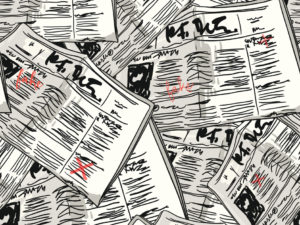
The term ‘Fake News’ blurs reality as language silos meaning and use. The question becomes, how do we communicate generally if terms and phrases hold different meaning depending on political perspective and ideology?
